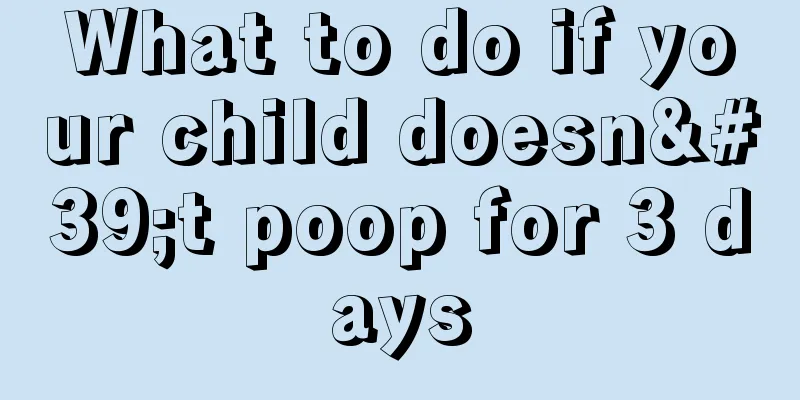The newborn's nasal mucus disappeared after being sucked back

|
We all know that newborns are very delicate when they are just born. At this time, children are particularly fragile. Even mothers need to be careful when holding them, because if they use improper force, it is likely to cause damage to some part of the baby's body. Newborns will have a phenomenon of sucking back their nasal mucus. So what should we do when the newborn's nasal mucus is sucked back and disappears? Normally, a baby's nasal discharge is light yellow in color. If the baby has a lot of mucus in his nose, which flows out again immediately after being wiped, and the mucus becomes clear, or the dry nasal mucus blocks the nostrils, and the baby can only breathe through the mouth, then you should be alert because the baby may have a cold. Babies who are still breastfeeding often stop after a few sips of milk to breathe through their mouths, or cry while breastfeeding. It is very likely that their noses are blocked by snot or mucus, and a nasal aspirator should be used to suck out the snot. If the mucus from the nose has a bad smell and contains blood, and the nose is swollen and tender, it is likely that there is a foreign object in the baby's nose. At this time, you must see a doctor. The baby's nasal secretions may be inhaled into the mouth, enter the esophagus, and then enter the stomach. There is no danger. In this case, it generally will not enter the trachea. If it enters the trachea, the baby will have difficulty breathing and symptoms such as coughing and holding back. It is recommended to pay attention to the baby's nasal secretions and clean them regularly. Use the thinnest cotton swab to gently twist it in the nasal cavity and the secretions will come out naturally. Do not pick or dig it out. If the nasal secretions are dry crusts, first use a cotton swab dipped in warm water to drop two drops of water into the nasal cavity, then gently pinch the base of the nose with your hand, and the secretions will come out naturally when the baby sneezes. If your child's nasal mucus disappears, you can use saline nasal drops to spray it. The mucus will soften and then flow out. Use a moistened cotton swab to gently roll out the secretions. If you dip it in baby oil, the effect will be better. You can also use a nasal aspirator, cover the soles of your baby's feet with slightly scalded ginger powder, and warm the fontanelle with a hot towel.It usually does not enter the trachea. If it is inhaled, it can enter the pharynx, but it usually does not enter the trachea. Suggestions: There are cartilages blocking the trachea. Once there is a foreign object, people will cough reflexively. If they cannot cough it out, it will be stuck there and the person will feel very uncomfortable. At this time, a bronchoscope is needed to clip it out. |
<<: What to do if your child has a bump on his head
>>: How to get rid of baby's hard nasal mucus
Recommend
What are the symptoms of spleen deficiency in babies?
Spleen deficiency is mainly a term used in tradit...
Children with fever 38 degrees
It is common for children to catch a cold and hav...
What should I do if my child has redness, swelling and ulcers on the upper part of his throat?
Children's bodies are very fragile and can ea...
My 5-year-old child can't speak clearly. What's wrong?
If a five-year-old child still cannot speak clear...
How to deal with baby's dislike of eating?
Nowadays, most parents encounter the problem of c...
The child urinates a little
Since children do not have the ability to urinate...
How to treat vitiligo in children effectively
Children are the hope of the motherland and the f...
Treatment of intestinal gas in children
Children are more likely to be infected with bact...
What should children with allergic purpura pay attention to in their diet
When babies are young, because of their poor immu...
How to treat bad breath in children
It is a very common phenomenon for children to ha...
Consequences of a cough vaccination
Vaccination actually refers to vaccination, which...
What is the cause of the child's tongue?
Children's tongue scratching is caused by ora...
What to do if your 3-year-old baby always wets the bed
It is actually very common for children to wet th...
Parents should grasp the best time to treat hernia in children
Hernia mainly occurs in two groups, most commonly...
One year old baby has fever and shivers while sleeping
If a one-year-old baby has a fever, the body will...









